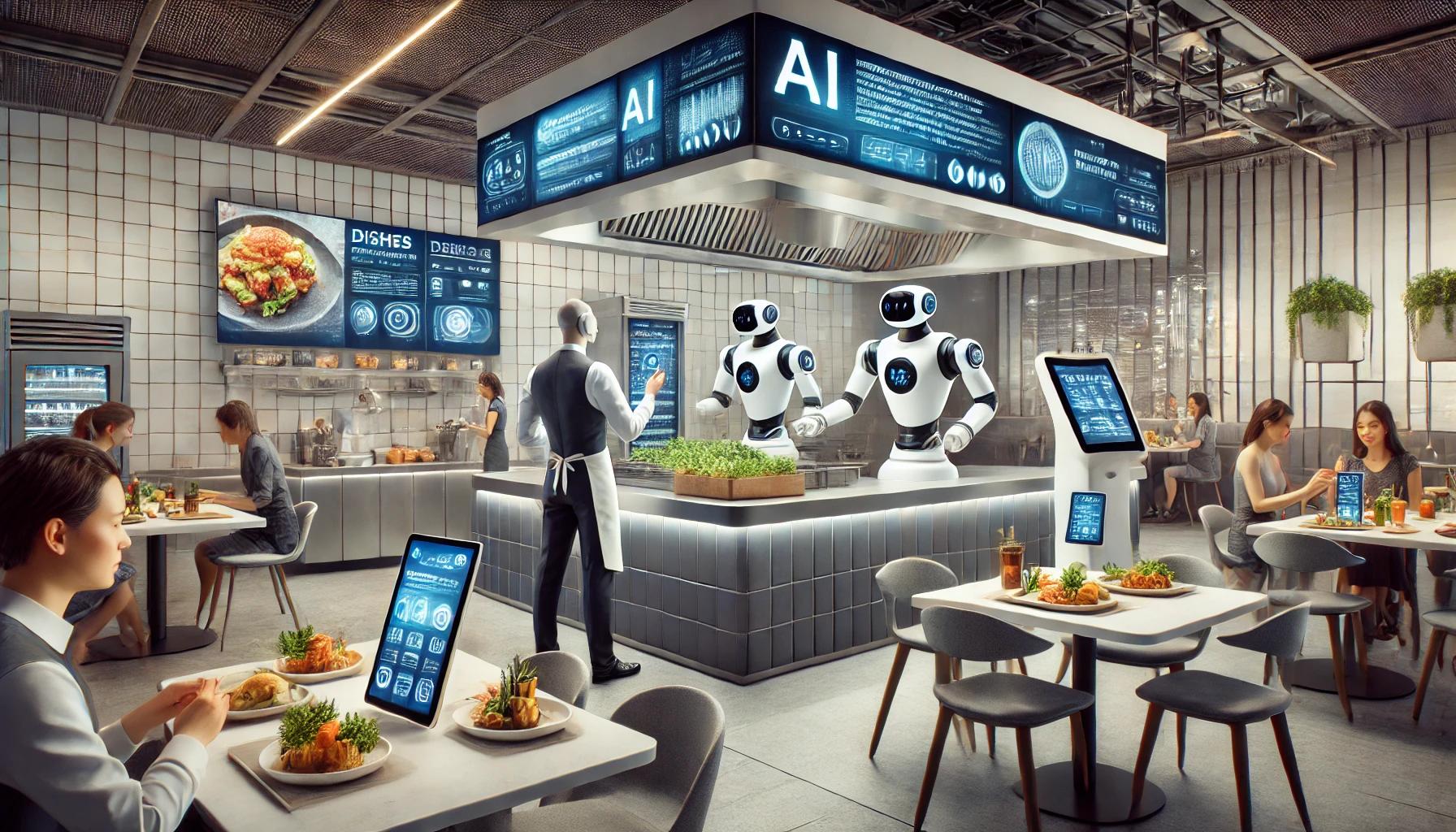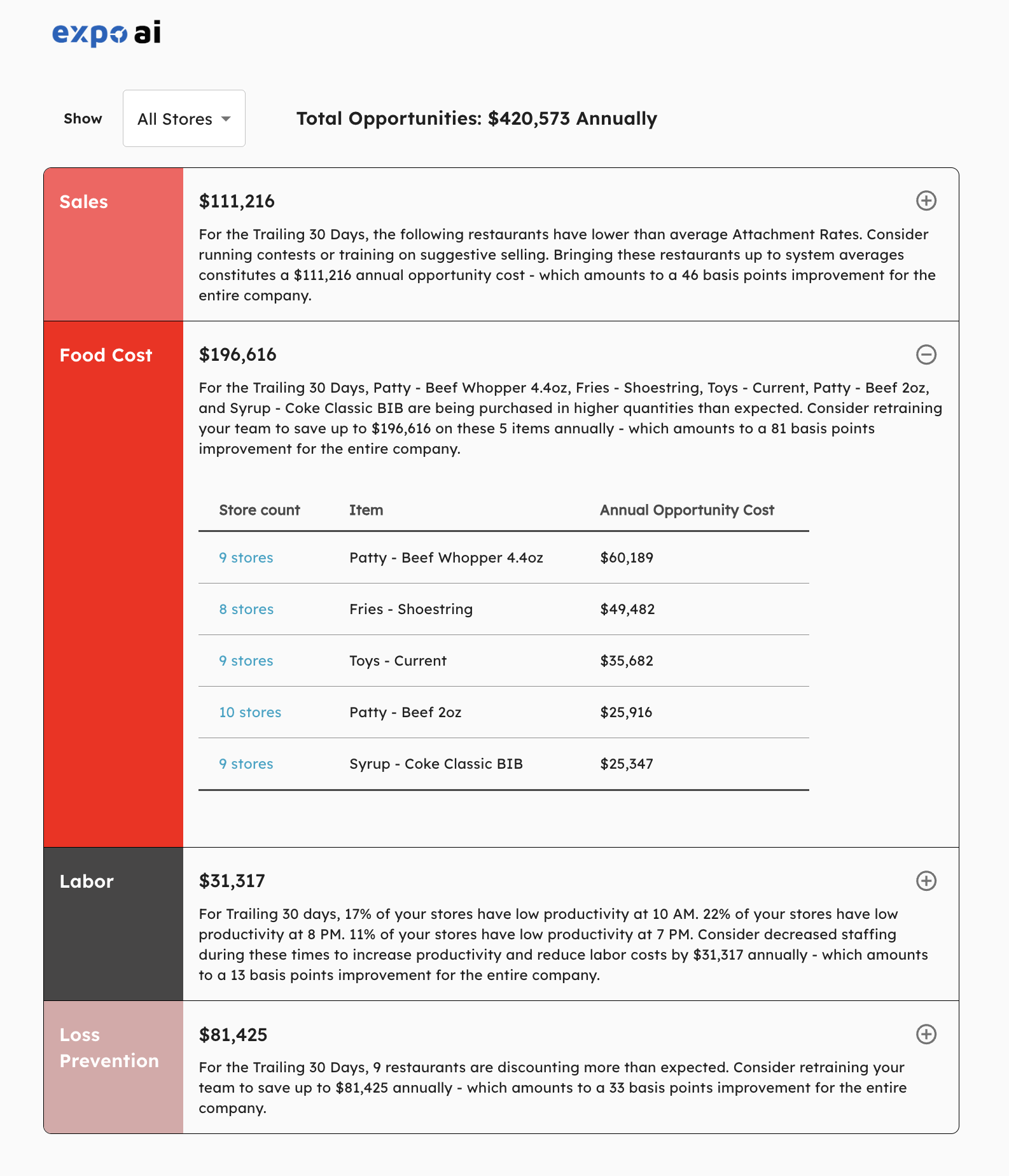
AI in the Restaurant Industry: A Primer
April 6, 2025
What if I told you that you could type in a question like “How do I improve my delivery sales?” or “How can I lower my labor costs?” and get an answer instantly? In the past, you’d have to pay a consultant or ask your COO or CFO to spend weeks analyzing the data for each of your stores to get an answer. Now with AI, it’s become a reality.
We’ve all seen the headlines: AI is taking over the world. Artificial intelligence is all anyone is talking about these days. Whether it’s all hype or reality, one thing is true, every business across all industries are trying to figure out how AI will impact them. This is just as true for the restaurant industry as any other. But it’s not very clear how AI will impact restaurants, because it is a people-first business. In a service industry, where people are preparing and serving food to other people, how does AI come into play? That’s the billion dollar question that many are asking. Restaurant operators around the globe are wondering how they can leverage AI to help their businesses improve performance and increase the bottom line. There are a number of ways that AI will have a huge impact on restaurants, so let’s break them down.
Not everyone is familiar with what AI really means. The term is thrown around loosely these days and it can mean different things to different people. Artificial Intelligence or AI refers to the simulation of human intelligence processes by machines, especially computers. These processes include learning, reasoning/deduction and self-correction. Think of AI as a toddler learning how to use a fork by trial and error, except it’s a computer and it can learn infinitely faster than a human can because it can run thousands of trial and error experiments in rapid succession. You can see this when you use AI image generators or watch robots learning to perform a task. You will see some comical mistakes like images of people with extra fingers or robots tripping over themselves, but over time, they learn from those mistakes and adapt.
You already use AI in your daily life: The autocomplete suggestions in your text messages or email application are based on AI predicting what you’re going to write next. The recommendation engine on Netflix that knows what shows or movies you like to watch. The voice recognition on your phone or Alexa. All of these use a form of AI to operate. Other examples of this that you may have seen are self-driving cars and text summaries of your video conference calls on Zoom.
Here’s a helpful primer on different types of AI:
Ultimately, the goal of AI is to create systems that can perform tasks that normally would require human intelligence, and are designed to enhance human capabilities and efficiencies. Most AI that we see today is known as narrow AI, designed for specific tasks. AGI or Artificial General Intelligence refers to a type of artificial intelligence that possesses the ability to understand, learn and apply knowledge across a broad range of tasks at a level comparable to human intelligence. In other words, AGI would replicate the cognitive abilities of the human brain and allow it to perform any intellectual task a human can. This is when you get into the science fiction level of Jarvis from Iron Man or C3P0 from Star Wars.
You might be thinking, all of this is interesting, but how does any of this affect me as a restaurant owner or operator? Robots are the future, but they’re also extremely cap-ex intensive and not a realistic option for most restaurants. Do a search on AI for Restaurants and you’ll get results that focus on mostly customer service, but there are many ways that AI can help restaurant operators today:
Personalized Customer Experience:
Operational Efficiency:
Menu Optimization:
Kitchen Automation:
Customer Feedback and Sentiment Analysis:
Staff Management:
Marketing and Promotions:
Delivery and Takeout:
As you can see, there are numerous ways that AI will help the restaurant industry by enhancing the customer experience and improving operational efficiencies. Expo is leading the pack as the only AI platform for restaurant operations that can give your team insights and answers. Expo creates your data warehouse with all of your data sources and connects the dots. By analyzing and learning from your data, the AI can determine patterns and identify opportunities for improvement. Think of it as your real-time analyst that works 24-7 looking for ways to enhance performance. The AI looks at all your stores and identifies ways to increase sales from salesmanship, delivery and customer feedback. It also finds ways to decrease costs from labor, inventory, waste, and loss prevention. Expo quantifies the size of each opportunity in dollar amounts so your team can prioritize.
“Expo has played a crucial role in boosting our client’s free cash flow by +3.5 margin points, equating to an impressive $3.5 million! We rely on it daily to efficiently manage and optimize our group of portfolios of restaurants and nightclubs, pinpointing opportunities with ease. As a finance professional, Expo is indispensable to my work and the success of our clients.”
- B Brian Martin, Managing Partner of AnalysisLAB (a boutique hospitality consulting firm) talking about a restaurant group in Dallas
The power of AI is that it can scale and grow with your business, because it is automated and can perform complicated analysis that would take a human several dozen hours to generate. This generally would fall on your team to spend time doing, instead of working on what matters, serving the needs of your customers. Here is an example of a company overview of a large fast food franchise:

Think of it as a health check. You can’t expect your doctor to know what’s going on with your health without getting a blood test or checking your blood pressure and other vitals. Why should you expect it to be any different for your business? Expo gives you and your managers a daily health report on each of your stores. It looks at their metrics and “vitals” and compares it to where a healthy operation should be. It helps your team focus on the things that will move the needle instead of going on hunches or waiting for an Excel spreadsheet from your analyst.
For more information on how Expo works and what it can do for your business, please visit the Expo website.